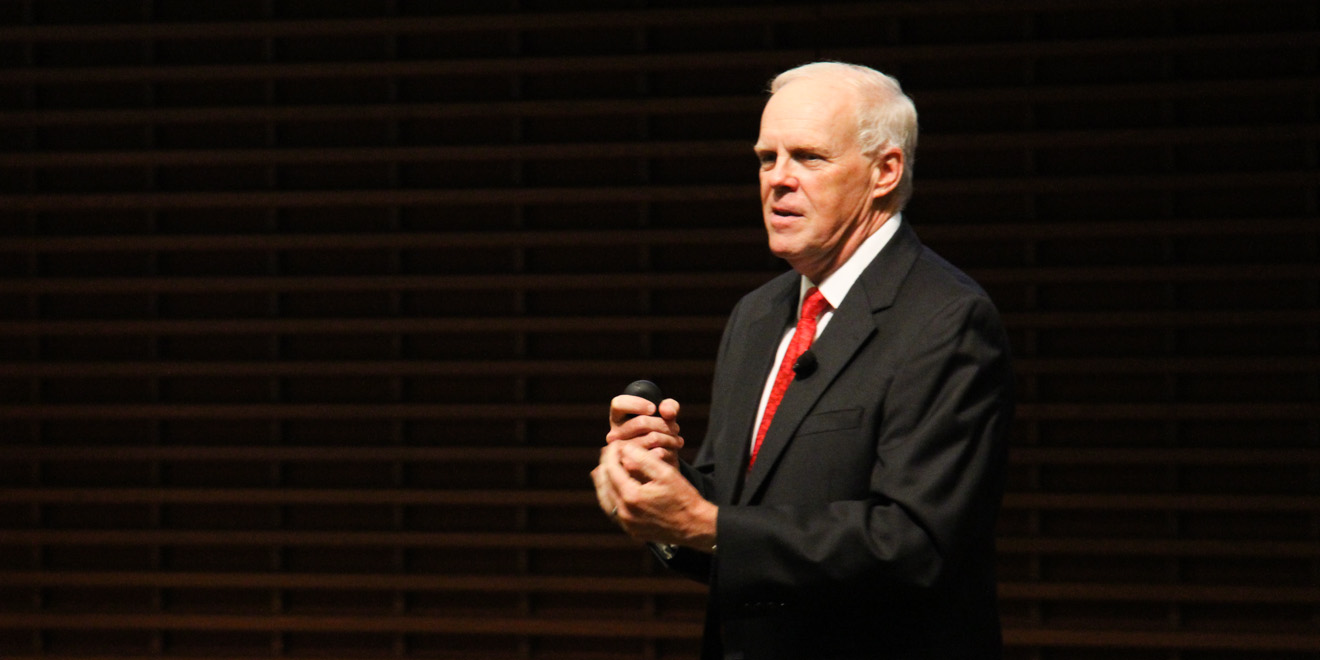Stanford is announcing the launch of a new graduate scholars program and associated $750 million endowment. The Knight-Hennessy scholars program will be analogous to the Rhodes and Schwarzman scholarships, aiming to attract the world’s most talented graduate students to Stanford for studies across the University’s seven schools. The program will be the world’s largest fully-endowed scholarship.
The Knight-Hennessy program will bring a cohort of 100 graduate students to Stanford each year for both masters and doctoral studies. The scholarship will cover three years of study at Stanford, with the individual schools covering the subsequent years of M.D. and Ph.D. programs. A $100 million gift from Robert King MBA ’60 and his wife Dorothy will be set aside to fund scholars from developing countries.
The scholarship is named after Philip Knight MBA ’62, co-founder of Nike, who donated $400 million to the scholarship’s endowment, and President John Hennessy, who will serve as the inaugural director of the program. Hennessy will assume the position in September, after stepping down as president. Jeff Wachtel, Hennessy’s current chief of staff, will serve as the program’s executive director.
Knight’s gift is the largest individual donation of money to Stanford in the University’s history. The announcement comes amidst heightened scrutiny of mega-gifts to elite universities; however, Hennessy argued that the donation will make a real impact.
“80 percent is going to support students…. I can’t tell you how important it is that we want students to graduate without debt, so that if they want to go into a nonprofit or if they want to go into government, they will not have to worry about debt,” he said during Wednesday morning’s webcast announcement.
“I’ve never raised this much money this quickly, and I think it’s because the reaction of the people. The enthusiasm they have for what we’re trying to achieve here is really inspirational,” Hennessy added.
An inaugural class of 50 scholars will arrive at Stanford in fall of 2018. Potential applicants must be nominated to the program by their undergraduate school and will then apply separately to both the Knight-Hennessy program and their degree program of choice. Admissions criteria will be decided by a faculty advisory board, and a separate committee of faculty and leaders outside of Stanford will make the final selection of scholars.
While scholars will be housed among Stanford’s larger graduate student population, they will have access to the Denning House, a building which will be constructed on campus and serve as the center for the Knight-Hennessy scholar community.
Besides access to the house, scholars will enjoy other features unique to the program. According to the program’s website, the scholars will participate in personal development programs, including the new King Global Leadership Program and “immersion study trips with access to thought leaders across the business, government and nonprofit sectors.” Additionally, a fund will be established to back nonprofit social startups founded by Knight-Hennessy scholars and alumni.
Both Knight and Hennessy expressed high expectations for the program and scholars.
“John and I dream of a future 20, 30 or 50 years from now, when thousands of graduates – who can think outside the box as skilled problem-solvers – will be working together for a more peaceful, habitable world,” Knight told the Stanford Report.
“We wanted to create something enduring, that would be unlike anything else currently available to the world’s brightest minds, and that would make the biggest impact possible toward solving global challenges affecting the environment, health, education and human rights,” Hennessy said.
“We will bring together outstanding, courageous scholars to benefit from Stanford’s innovative educational environment, who then go on to lead governments, businesses, nonprofits and other complex organizations and develop creative solutions to effect positive change,” he added.
Ada Throckmorton contributed to this report.
Contact Michael Gioia at mgioia2 ‘at’ stanford.edu.
